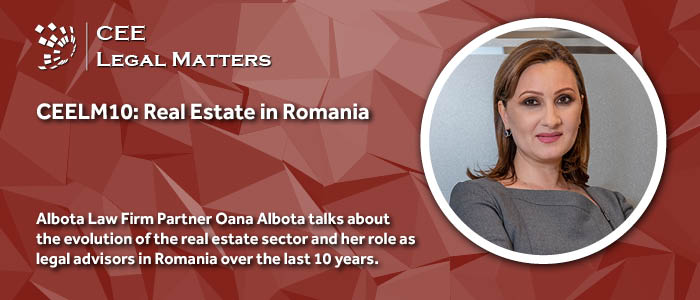Albota Law Firm Partner Oana Albota talks about the evolution of the real estate sector and her role as legal advisors in Romania over the last 10 years.
CEELM: Over the last 10 years, what types of real estate projects have kept your team the busiest?
Albota: In terms of what we do in general, we’ve been involved in a diverse range of real estate projects, adapting our services to each project’s nature. Our assistance spans from the initial stages of a project until the exit. We tend to act for foreign developers and we assist them in every stage of a real estate project. At the acquisition stage, we perform extensive due diligence in share deals and asset deals, title and permitting verification for land and buildings, title insurance, and offer transaction assistance. During project development, we assist with design and construction agreements, settlements of disputes in construction contracts, construction litigations and arbitrations, lease agreements, financing agreements, including security packages, disputes with the authorities deriving from their delays in issuing various construction permits and certificates, etc. Lastly, during exits, again, we provide assistance with the transactional aspects and mitigation of due diligence issues identified by purchasers’ consultants.
Looking at the past 10 years, there have been interesting trends that we’ve been able to spot. The pandemic shifted market priorities toward residential projects due to the surge in remote working, which adversely affected office space demand. Consequently, this led to more complex leasing agreements with substantial tenant incentives. Despite these market challenges, some clients chose to sell their office assets, adopting innovative strategies involving staggered payment plans and rental guarantees, a significant deviation from pre-pandemic practices.
CEELM: Looking back at the last 10 years, what have been your and your team’s most intense periods?
Albota: Recent few years were marked by an uptick in litigation related to construction agreements – a byproduct of the pandemic and geopolitical tensions. Delays in material delivery and increased construction costs led to disputes over lump-sum price construction contracts. We navigated through two principal scenarios: renegotiating contracts through addendums or dealing with contractor insolvencies. The industry’s response to these challenges has been a shift away from lump-sum contracts toward more intricate agreements. Post-pandemic, our focus shifted from high-profile transactions to renegotiating existing contracts that better reflect the market’s evolving needs or replacing them with more complicated agreements that provide parties with securities for uncertain situations . Economic pressures have been a constant, requiring us to adapt and find innovative legal solutions.
CEELM: How have the profiles of real estate clients evolved over the last decade, and what trends do you observe in terms of their projects and investments?
Albota: While the overall client profile has remained relatively static, some international clients have paused new projects in Romania due to market uncertainties. Nonetheless, our long-standing clients continue to invest in Romania, while new clients show a notable interest in green energy projects – a trend driven by the global energy crisis.
CEELM: In terms of client needs, what new expectations do you see emerging in the real estate sector from real estate lawyers, and what aspects do you think have decreased in importance over time?
Albota: Clients increasingly seek a deep understanding of commercial matters and transactional structures from their legal advisors. They prefer practical solutions and strategies over mere problem identification. The economic climate has heightened pressures on clients, which are often transferred to us. However, our long-term relationships with clients have enabled us to align our approaches effectively.
CEELM: From a legislative/regulatory standpoint, what have been the main recurring challenges your team has faced in facilitating real estate deals and projects?
Albota: A significant challenge for the legal market has been the reluctance of public authorities to assist in urban planning, particularly looking at Bucharest under the new mayor’s administration.
This change in urbanism policies has led to a market slowdown, affecting developers’ projects. Additionally, delays in building permit issuances, coupled with the spike in construction costs and material shortages, have further complicated the real estate landscape.
CEELM: What is on the horizon for the real estate sector? What do you believe will be the highlights in a similar interview 10 years from now, and how do you anticipate the industry evolving?
Albota: The focus on energy projects is likely to continue, with logistics gaining traction due to anticipated infrastructural improvements. A more supportive approach from public authorities could enhance Romania’s appeal to foreign investors. The office sector is expected to recover as the trend of remote working stabilizes, and people recognize the benefits of working in physical office spaces. This shift will foster a more dynamic and collaborative professional environment.
All in all, I can safely say that the real estate sector is evolving, influenced by economic factors, technological advancements, and shifts in work culture. Our role as legal advisors is to navigate these changes, provide strategic guidance, and adapt to the new landscape of real estate transactions and I think there will be more interesting ground to cover in the coming decade.
Albota Law Firm is CEE Legal Matters' Practice Leader for Real Estate in Romania for 2024 – learn more here.
This article was originally published in Issue 10.11 of the CEE Legal Matters Magazine. If you would like to receive a hard copy of the magazine, you can subscribe here.















